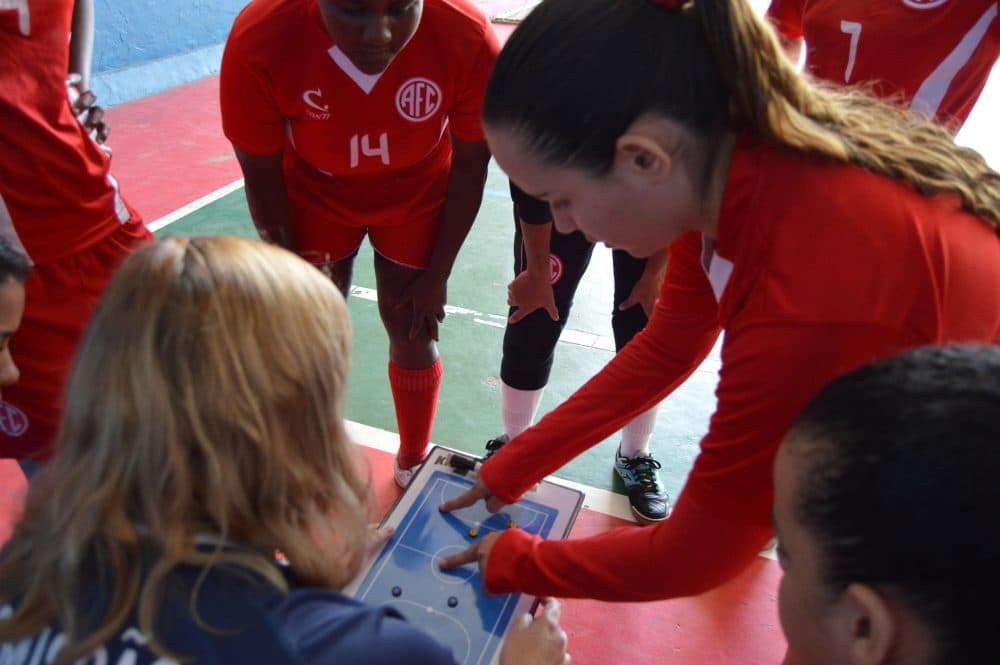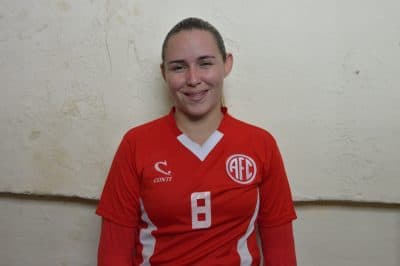Advertisement
In Brazil, Brenda Rodrigues da Silva Fights For 'An Opportunity For Women's Soccer'

Brenda Rodrigues da Silva lives in São João de Meriti, a low-income community on the outskirts of Rio de Janeiro. Dusty roads climb the hills where thousands of families have built their homes. These are the same streets where Brenda learned to play soccer.
"I think she began playing soccer inside my belly, because when she was little, right around 8 months old, I bought a doll for her," Brenda's mother, Rosemara, says in Portuguese. "And that's when we discovered how much she liked soccer. She pulled the doll's head off and started to play."
Brenda is the second oldest of seven. Her older brother, Bruno, 28, is trained as a welder, but he's been unemployed for three years and brings in income from odd jobs. Their 14-year-old twin brothers are legally blind.
"They were born, born with a vision problem," Rosemara says. "They study in the Benjamin Constant Institute, because no school would take them because they have partially dislocated retinas. So there's no way to even do a transplant, even if we had the money for that."
While Rosemara fought to get the twins an education, Brenda wasn’t very committed to her own studies.
"I was never really a fan of school. My thing was playing ball," Brenda says in Portuguese. "I’m being really honest. I’m a real ball hog. I cut class to play. My classmates would come here, and say, 'Let’s go play ball,' and I’d go, 'Mom, there’s no class today.' I totally lied. It was a school day and everything. The director of the school yelling at me, 'Come on, Brenda!' to stay in school. 'No, I want to play ball.'
"The thing is that, then, I didn’t know that studying could help much more than I do now. I was a kid back then. I was always stuck on soccer. I would follow Marta. I would follow Cristiane. 'No, I want to play ball.'"
Adversity On And Off The Pitch
The roof over Brenda’s house leaks when it rains, and all eight family members sleep in a single room with a queen-sized bed and a mattress on the floor. Rosemara managed to get government support for one of the boys, but not the other. And their care takes all her attention.
So when Brenda was 16, she dropped out of school to go to work doing odd jobs. What she wanted was to make money playing soccer.
"Being the best on the field, I thought I would earn something," Brenda says. "It was kind of a messed up view, so to speak — not in terms of my dream, but in terms of the day to day. I knew my dream was right, that it was what I wanted. But if I had a better education, I would be better off now, you know?"
Thing is, being a female soccer player in Brazil isn’t easy.
"We have to be athletes on and off the field, because we really get targeted with abuse outside: 'Girls don’t know how to play ball. What are you doing there?'" Brenda says. "There are men who think a woman should be in the kitchen. No, women should be where they want to be."
Advertisement
When Brenda was a kid, Rosemara would chase her from the street to stop her from playing. In the home of the Brazilian bikini wax, women don't play soccer. Unless, the stereotype says, they're gay. Rosemara says her daughter’s straight. But there’s more to the harassment than questions about sexual orientation.
"Morally, she’s been very hurt by discrimination," Rosemara says. "She’s already experienced a lot of discrimination. But her older brother always really believed in her, you know. Once I went to him, and I said, 'Bruno, I’m afraid of this, this and this.' He turned to me and said, 'Mom, if it’s her life choice, it’s hers. If that’s what she wants, it’s her choice.'"

About a year ago, Brenda got a tryout for the America Football Club, a semi-pro women’s team attached to a men’s club. And Brenda made it. But that hasn't turned things around. Brenda continues to work off the books to help her family. Even though the team helps her, she sometimes skips meals so she can pay her bus fare to get to practice.
When I visited, there were two pots on the stove, but the refrigerator held a couple of zucchinis and not much else. Still, things are better than they used to be.
"To say we're going hungry is an exaggeration, thank God," Brenda says. "We have rice and beans or meat. It wasn't like that before, was it, Mom? Before we ate mandioca flour. Beans with mandioca flour and grits. Now, thank God, I´ve grown up, and we each help out at home. Before it was just my older brother and my Mom, so it was tough."
"I know there’s a time when I’ll stop. I’m 21. But I’m chasing the dream now, and I’m not going to stop. As long as my legs work, have strength, even if I have to walk, I’m going to try to help."
Brenda Rodrigues da Silva
Brenda would like to go back to school, but the team doesn’t know that.
"I think they would help, yeah. But I try not to ask because they already do a lot, you know?" Brenda says. "They already do a lot for me. So I try to find a solution outside. Leave this quiet and find a solution outside. Because going into the club and asking for something is kind of embarrassing."
Brenda's Project For Women's Soccer
Brenda’s house is tucked into the base of a hill, and to get to the road, she has to climb a nearly vertical cement staircase. We climb that staircase to a dusty road and then follow it to a worn dirt track over the crest of the hill and down to a paved street. There are no streetlights here, and Brenda tells me she walks this path late at night when she returns from practice.
"Where I'm taking you, it's a kind of project that I organize with the girls to help out," Brenda says. "Because I at least have the club; I play for America. There are girls who don't have this opportunity. So I had an idea of calling the girls who I see just playing ball in the street. And I have this project for women's soccer. With no support. We don't have anything. Just a ball, training vests and we play ball. That's it."
The nets are so shredded that they look more like Halloween cob web decorations than anything else. Even so, this is a prized space, one usually occupied by men and boys.
One of the girls has come in flip flops, so I ask if they play that way. The answer is laughter — because they can fall down and get scraped and bruised, but, they say, playing barefoot would form unattractive callouses.
After years of watching her daughter struggle, Rosemara now backs Brenda’s dream.
"I'm not going to say my dream, but I'm going to see my daughter on the national team," Rosemara says. "And I'm going to cheer a lot. And I promised that when she makes the national team, I'll go to pray on my knees at Porto de Caxias."
I watched Brenda play for America. It was the semifinals of an indoor tournament, but there were just a handful of people in the stands. Women’s soccer has a long way to go before it gets the support the men’s game does in Brazil.
"This is what I want: an opportunity for women’s soccer," Brenda says. "I know there’s a time when I’ll stop. I’m 21. But I’m chasing the dream now and I’m not going to stop. As long as my legs work, have strength, even if I have to walk, I’m going to try to help."
It’s the offseason now, and so Brenda is focused on her community project and working to support the family. But her sights are set on raising the game for all women in Brazil.
This segment aired on January 14, 2017.